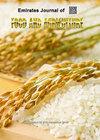Simultaneous green synthesis of Magnetite-Nanoparticles MNPs using microalgae Spirulina sp. for antibacterial activity
IF 0.7
4区 农林科学
Q3 AGRONOMY
引用次数: 0
Abstract
Biosynthesize of Magnetic Nanoparticles MNPs is the environmentally friendly synthesis of nanoparticles that can be used as an alternative to commercially available antibiotics. The present study aimed to determine the ability of biosynthesized magnetic nanoparticles of Spirulina sp. for antibacterial activity. Microalgae isolated from the Gomaspan river cultured on BG11 medium and, is identified using morphology and molecular method and the optimum growth rate of microalgae studied, the biomass used to synthesize of MNPs then was characterized by a visible color change and Scanning electron microscope SEM, FTIR with XRD. Antimicrobial activity of Spirulina sp. and biosynthesize of MNPs. studied using different extracts (ethanol, methanol and Diethyl ether) against growth of Salmonella Typhi, Streptococcus pyogenes, Escherichia coli and pseudomonas aerogenes by disc diffusion and Minimum inhibitory concentration methods. The antibacterial activity from microalgae Spirulina sp. and biosynthesized MNPs from Spirulina sp. showed to inhibit growth of bacteria with both methods and the higher inhibition zone showed as (30-37mm). The minimum inhibition concentration showed with ethanol extract (125-500 µg/l). The current study is first report an eco-friendly and convenient method for the synthesis of MNPs using Microalgae Spirulina sp. extracts. This biosynthetic process might be useful pharmaceuticals, and medicine treatment of pathogenic bacteria. Keywords: Nanoparticle, Magnetic, Spirulina, Antibacterial, solvent extract利用具有抗菌活性的微藻螺旋藻同时绿色合成磁性纳米颗粒MNPs
磁性纳米颗粒MNPs的生物合成是一种对环境友好的纳米颗粒合成,可作为市售抗生素的替代品。本研究旨在测定螺旋藻生物合成的磁性纳米颗粒的抗菌活性。从Gomaspan河中分离出的微藻在BG11培养基上培养,利用形态学和分子生物学方法对微藻进行鉴定,并研究了微藻的最佳生长速率,然后用可见颜色变化和扫描电子显微镜SEM、FTIR和XRD对用于合成MNP的生物量进行了表征。螺旋藻的抗菌活性及MNPs的生物合成。采用纸片扩散法和最小抑菌浓度法研究了不同提取物(乙醇、甲醇和乙醚)对伤寒沙门氏菌、化脓性链球菌、大肠杆菌和产气假单胞菌生长的抑制作用。微藻Spirulina sp.和螺旋藻生物合成的MNPs的抗菌活性均显示出抑制细菌生长的作用,较高的抑制区为(30-37mm)。乙醇提取物的最低抑制浓度(125-500µg/l)。本研究首次报道了一种利用螺旋藻提取物合成MNPs的环保、方便的方法。这种生物合成过程可能是有用的药物,以及治疗病原菌的药物。关键词:纳米粒子,磁性,螺旋藻,抗菌,溶剂提取物
本文章由计算机程序翻译,如有差异,请以英文原文为准。
求助全文
约1分钟内获得全文
求助全文
来源期刊

Emirates Journal of Food and Agriculture
AGRONOMYFOOD SCIENCE & TECHNOLOGY&nb-FOOD SCIENCE & TECHNOLOGY
CiteScore
1.80
自引率
0.00%
发文量
18
期刊介绍:
The "Emirates Journal of Food and Agriculture [EJFA]" is a unique, peer-reviewed Journal of Food and Agriculture publishing basic and applied research articles in the field of agricultural and food sciences by the College of Food and Agriculture, United Arab Emirates University, United Arab Emirates.
 求助内容:
求助内容: 应助结果提醒方式:
应助结果提醒方式:


